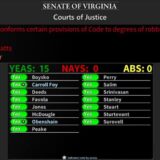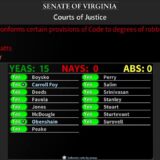A psilocybin treatment bill was recently introduced on June 6 by California Sen. Brian W. Jones and Sen. Josh Becker, which if passed would create a pilot program for psilocybin therapy.
Senate Bill 803, also called the Heal Our Heroes Act, was attached as an amendment to an unrelated bill last week. If passed, it would allow San Francisco County, Santa Cruz County, and San Diego County to conduct a pilot program for veterans and first responders to use psilocybin or psilocyn. Those counties would be in charge of approving various facilitators, including “licensed physician or surgeon, clinical psychologist, licensed clinical social worker, nurse practitioner, physician assistant, licensed professional clinical counselor, or a naturopathic doctor.” The program would last for three years, with data set to be compiled and reported starting after the beginning of the second year.
In a press release that introduces the bill on June 6, Jones stressed the importance of providing the opportunity for veterans to benefit from psilocybin treatments. “As a dedicated advocate for veterans and first responders, I firmly believe it is our duty to support and heal the brave individuals who served our country and communities,” Jones said. “To be clear, I’m not calling for the widespread legalization of psychedelic drugs. Rather, I’m championing a targeted medical treatment aimed specifically at aiding veterans and first responders in their recovery. The Heal Our Heroes Act is a thoughtful and balanced measure designed to rigorously study the effectiveness of these treatments with the hope of providing much-needed relief to those patients who need it most.”
Becker followed up with high expectations to support veterans and first responders. “SB 803 is an entirely new and innovative effort that is the result of comprehensive discussions on how the state can best support our veterans and first responders with a viable treatment for work-induced post-traumatic stress disorder,” Becker said. “We have a responsibility to do everything possible to provide quality care to these heroes, and I am proud to joint author this bipartisan effort that will have a real impact on the people who serve our state and country.”
The Heal Our Heroes Act is sponsored by two veterans organizations: the Heroic Hearts Project and Veterans Exploring Treatment Solutions (VETS). A representative from the Heroic Hearts Project, Jason Moore Brown, is also a sponsor of the measure. In a press statement, he explained that he has personally struggled with PTSD and mental health as a decorated combat veteran, and approved of Jones and Becker’s bill. “We have lost over 130,000 Veterans to suicide since the Global War on Terror began in 2001,” Moore said. “I know first hand that psilocybin, when used responsibly and with support, has the potential to save the lives of California’s Veterans. This pilot program is the responsible first step to reducing, and hopefully ending, the Veteran suicide epidemic.”
In fall 2023, the legislature passed Senate Bill 58 (sponsored by Sen. Scott Wiener and Assemblymember Marie Waldron) but was vetoed by California Gov. Gavin Newsom. “Both peer-reviewed science and powerful personal anecdotes lead me to support new opportunities to address mental health through psychedelic medicines like those addressed in this bill,” Newsom said. “Psychedelics have proven to relieve people suffering from certain conditions such as depression, PTSD, traumatic brain injury, and other addictive personality traits. This is an exciting frontier and California will be on the front-end of leading it. . . . I urge the legislature to send me legislation next year that includes therapeutic guidelines.”
Recently in May, a different psychedelic bill that also sought to pass treatment centers recently ended its run in the Senate Appropriations Committee. Called the “Regulated Therapeutic Access to Psychedelics Act,” Senate Bill 1012 would have created dedicated psychedelic service centers to allow patients legal access to psilocybin, DMT, mescaline, and MDMA in a regulated setting. SB-1012, also sponsored by Weiner, described the bill as a “direct response to the Governor’s request” in April.
Following the rejection of SB-1012 in May, numerous advocate organizations condemned the decision to terminate the bill. “We are deeply disappointed that the Legislature has missed this opportunity after four years of debate to enact a policy that would create a responsible program and promote the safer use of psychedelics in California and create a model policy for the rest of the country,” said Alliance for Safer Use of Psychedelics (ASUP) campaign director Jared Moffat. “Californians will continue to seek out psychedelics for all sorts of reasons, including to help alleviate mental health challenges like PTSD, depression and anxiety. Many will do so without guided support and use psychedelics on their own, which increases risks. Veterans and others will continue to leave the country or go underground to seek unregulated services that may be unsafe.”
These bills failed to pass, but advocates are pushing for a potential ballot initiative in 2026 that would legalize psychedelic substances such as psilocybin and MDMA. After Weiner’s bill was killed, he told KQED that he will keep trying to push for access to psychedelics. “We are not giving up, whether that means introducing a new bill or ballot measure, this issue is not going away,” he said. “We know these substances are helping people turn their lives around.”




















